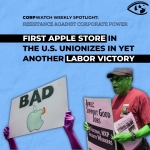US: 2001 Goldman Prize Winners Fight Greed
The day Jane Akre and Steve Wilson were fired from their jobs as investigative reporters at the Fox TV affiliate in Tampa, Florida they could never have guessed that today they would win a $125,000 prize for a report that never aired.
The report, exposing the dangers of the genetically modified bovine growth hormone rBGH, was killed by the television station when the hormone's manufacturers complained.
The Goldman Environmental Prize for North America goes this year to Akre and Wilson. Winners in five other geographic areas are honored too with the world's largest prize for environmental activists. The total of $750,000 is given annually to environmentalists from North America, South/Central America, Africa, Asia, Europe, and Island Nations.
This year the prizes go to eight people fought overwhelming odds to preserve the environment and protect public health.
The Goldman Prize was created by San Francisco insurance executive Richard Goldman and his late wife Rhoda to allow many grassroots environmental crusaders to continue their work in difficult and dangerous circumstances and expand public awareness of life and death environmental crises.
This year's winners, announced today in San Francisco, are:
- North America: Jane Akre and Steve Wilson - While reporting for WTVT-TV in 1996, the husband and wife team discovered that millions of Americans were drinking milk from rBGH treated cows without knowing it, although the genetically modified growth hormone had been banned in Canada and Europe. They found evidence of how the hormone, which can harm cows, was approved by the government as a veterinary drug without adequately testing its effects on children and adults who drink rBGH milk. They uncovered studies linking its effects to cancer in humans.
Just before broadcast, the station cancelled their report after Monsanto, the hormone manufacturer, threatened Fox News with "dire consequences" if the stories aired. Under pressure from Fox lawyers, Akre and Wilson rewrote the story more than 80 times. After they rejected offers of six figure sums to drop their ethical objections and keep quiet, they were fired in December 1997.
In August 2000, Akre won a suit against Fox for violating Floridas Whistleblower Law, which makes it illegal to retaliate against a worker who threatens to reveal employer misconduct. It is the first time journalists have used a whistleblower law to seek a legal remedy for being
fired by for refusing to distort the news. They must now defend the $425,000 award to Akre through the appeals process. They recently formed a video production company to cover environmental and health news. - South America: Oscar Olivera - Bolivian labor leader Oscar Olivera became an advocate for universal rights to affordable, clean water in 1999 when the Bolivian government responded to structural adjustment policies of the World Bank by privatizing the water system of its third largest city, Cochabamba.
Bolivia granted a 40 year concession to run the system and its $35 million debt to a consortium led by Italian owned International Water Ltd. and U.S. based Bechtel Enterprise Holdings with minority investment from Bolivia. The new water company raised prices. With the minimum wage at less than $65 a month, many of the poor had water bills of $20 a month.
Olivera, executive secretary of the Cochabamba Federation of Factory Workers and spokesman for the Coalition in Defense of Water and Life, known as La Coordinadora, led demands for the water system to stay under local public control. Thousand of citizens protested for weeks. The Bolivian army killed one person, injured hundreds and arrested several coalition leaders. Olivera negotiated with the government and won when the government cancelled the privatization contract and turned over control of the water system, including its debt, to La Coordinadora which Olivera continues to lead.
The fight continues in Bolivia. This month, members of a group of 1,000 workers, farmers, and other Bolivians were attested and beaten by the Bolivian armed forces as they marched from the country's major cities to the nation's capital, La Paz. They are demanding, among other things, an end to attempts by the government to privatize water. The government interevened in the march three times this weekend, using gas, beating and detaining marchers.
- Africa: Eugene Rutagarama - A conservationist who risked his life to save Rwanda's last 355 mountain gorillas, Rutagarama was forced to flee Rwanda during the massacres of the 1990s, during which most of his family was killed. Identified as a Tutsi, Rutagarama has endured a lifetime of persecution from the countrys Hutus.
As soon as he could, Rutagarama returned to rebuild the national park system. Tourism provides important income to Rwanda, but the protected areas were at risk of being overrun as the government tried to resettle more than two million people. Rutagarama created and built support for a strategic plan that led to the rehabilitation of the Rwandan Office of Tourism and National Parks and the protection of mountain gorilla habitat.
Risking his life, he delivered funds and supplies to park rangers in the Democratic Republic of Congo. Today, Rutagarama works for the International Gorilla Conservation Program, rebuilding ecotourism, monitoring the mountain gorillas and building relationships with the communities near the parks.
- Asia: Yosepha Alomang - An indigenous woman of the Amunge who live in West Papua, Irian Jaya, Indonesia, Mama Yosepha has organized resistance for 20 years to the destruction of the rainforest and her people's way of life by gold mining. The world's largest gold mining operation, owned by Freeport McMoRan Copper & Gold, Inc. of Louisiana, dumps at least 200,000 tons of tailings into local rivers every day.
Indonesian soldiers brutally suppress peaceful protests against the mine. In 1994, soldiers held Alomang for a week in a room knee deep with water and human waste, without food or drink. For six weeks she was tortured and interrogated for allegedly giving food to Papuan fighters resisting Indonesian sovereignty and Freeports land seizures.
Because Mama Yosepha and other leaders continue to speak out, these and other abuses became more widely known. Last May, a rock pile at the mine collapsed into a lake sacred to the Amunge, killing four people and flooding villages with contaminated water. Because of this incident and continued community activism, the Indonesian government has begun examining Freeport's practices. Most recently, Mama Yosepha created a womens group dedicated to human rights, environmentalism, and traditional culture of West Papua.
- Europe: Myrsini Malakou and Giorgos Catsadorakis - These two Greek biologists led the successful campaign to create a crucial wetlands conservation area located in remote northwestern Greece, adjacent to the borders of Albania and the former Yugoslav Republic of Macedonia.
The wetlands of Prspa in northwestern Greece are one of the most biologically rich and diverse regions in Europe. Over 260 species of birds migrate, winter and breed there, including the world's largest colony of the rare Dalmatian pelican. In the mid-1960s, government projects introduced large irrigation systems, commercial fertilizers and mechanized farming, endangering the intricate wetland ecology.
Malakou and Catsadorakis used their research in the region to help the local communities. They taught organic farming and reintroduced traditional practices that sustained both the people and the wetlands. They founded the community based Prspa Center for Man and Nature, and serve as scientific advisors for the Society for the Protection of Prspa.
Now destruction of the wetlands has been halted and restoration has begun. On February 2, 2000, in response to their proposal, the prime ministers of Albania, Macedonia and Greece signed an agreement establishing the first transboundary protected area in the Balkans. At the signing ceremony, the prime ministers declared that the Prspa Park would be a model of peaceful collaboration among their countries. Malakou and Catsadorakis are currently working on a management plan for the sustainable development of the new park.
- Island Nations: Bruno Van Peteghem - A resident of New Caledonia in the South Pacific east of Australia, Peteghem is working against time and mining interests to protect one of the world's largest coral reefs from destruction.
The geography of New Caledonia's reef provides protection from global warming bleaching that is killing most coral reefs. The most serious danger comes from nickel mining, the island's largest industry. With the support of New Caledonia's dominant ruling party, the RPCR (Rassemblement Pour le Caledonie dans la Republique), the International Nickel Company of Canada plans to dig up large portions of the reef for calcium carbonate to neutralize its acidic tailings. Numerous other companies are ready to proceed with this same process, and New Caledonia has no laws to prevent them from doing so.
Van Peteghem's campaign to place the reef on UNESCO's World Heritage List is the coral's best hope for protection. He and two organizations he co-founded, the New Caledonian Greens (Les Verts Pacifique) and Living Coral (Corail Vivant), lead a coalition of organizations and indigenous communities to save the reef.
Despite challenges from the RPCR, Corail Vivant is seeking to join the International Coral Reefs Initiative. Key backing has come recently from leadership of the political party representing the island's indigenous Melanesian people. Van Peteghem is working to build the public support that may convince the RPCR to endorse the World Heritage nomination.
"The world is getting smaller, and the need is growing for everyone to take responsibility for keeping our planet healthy," said Richard Goldman, founder of the Goldman Environmental Prize.
"The winners this year illustrate how the environment is affected by wars, international business, economic policies, and the tendency to put short term gains ahead of long term solutions. They also illustrate how the courage and commitment of a single visionary individual can make a difference for generations to come," he said.
Goldman himself is a winner this year. On April 25, he will receive the National Geographic Society Chairman's Award in recognition of his "exemplary contributions to every aspect of conservation and global environmental awareness." The last time the Society presented this award was 1995 to Lady Bird Johnson and Laurence Rockefeller.
Goldman Prize winners are selected by an international jury from confidential nominations submitted by over 20 environmental organizations and individuals representing nearly 50 nations.
In addition to the cash award, recipients travel to San Francisco and Washington, DC for an awards ceremony and presentation, press conferences, media briefings, and meetings with political, public policy, financial and environmental leaders.
The awards ceremony will be webcast live today. Three minute speeches by the winners and five minute videos on their work, can be seen live at http://www.goldmanprize.org at 5:00 pm, Pacific Time.
The first Goldman Prizes were awarded in 1990. Seventy-one previous Goldman Prize winners have defended the safety and health of their homelands from wars, destructive government projects and practices, multinational corporations, corrupt leaders, and international financial institutions.
- 180 Media & Entertainment
- 183 Environment
- 190 Natural Resources


